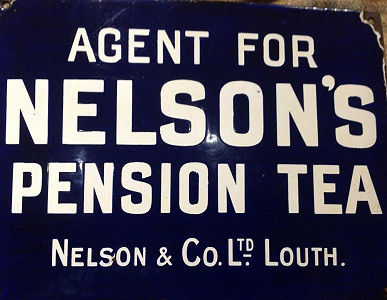Nelson’s Pension Tea Scheme

Enamel sign. Photo from Andy Cooper.

127 Eastgate
John Taylors, estate agents and auctioneers, are moving to 127 Eastgate. James Laverack discovered that at the beginning of the 20th century this property had belonged to the Nelson’s Pension Tea Scheme. Here is what we found in local newspapers.
A famous scheme was started in Louth by Mr Erasmus Jensen. Its initial success was so amazing that it spread to many parts of the country. It gave pensions to widows. This was before the government Old Age Pension was introduced in 1909.
To join Mr Jensen’s scheme, all you had to do was buy half a pound of Nelson’s Pension Tea each week, sold at forty per cent above the normal price of tea. If a regular customer became a widow, she was entitled to a pension of 10 shillings a week, so long as she remained a widow.
Advertisements for Nelson’s Pension Tea sprang up like mushrooms all over the country. It was estimated that half a million customers joined the scheme. The building in Eastgate, was the storeroom. Did the company actually pay pensions? It did – for a time. Postal orders were despatched by post.
Herbert Rawlings who retired from the Louth postal service in 1937 said “I had to make special journeys with the Nelson company’s correspondence because there was such a glut of it. I suppose that the bulk of letters to them would be from people applying to become purchasers of the tea in order to qualify for the pension. Every Friday afternoon, a clerk and a postman had to be put on overtime to deal with the mail sent by Nelsons. Mr Jensen must have been a man of great pluck to launch such a scheme. As I remember him, he appeared to be a man between 65 and 70, alert, quick, and he had the energy of a man of 40.”
In 1901, Mr Jensen sold the business for £90,000, about £1.4 million in today’s money.
The headquarters of the business moved to London, but the scheme soon failed as there was not enough capital to continue to pay the pensions. Mr Jensen had made a lot of money, but the widows and shareholders lost out. Nowadays, this type of venture would be called a Ponzi scheme, an investment fraud in which the initial investors are paid using the funds from new investors.
Mr Jensen claimed that he was concerned about the welfare of the poor. Many people, however, described him as a common swindler. Jensen lived only briefly in Louth, in James Street. Originally from Denmark, for about 30 years he had been in the grocery business in the south of England, and he spent five years in the USA where he was making cider. After leaving Louth, Mr and Mrs Jensen retired to Barnet with their new-found wealth.